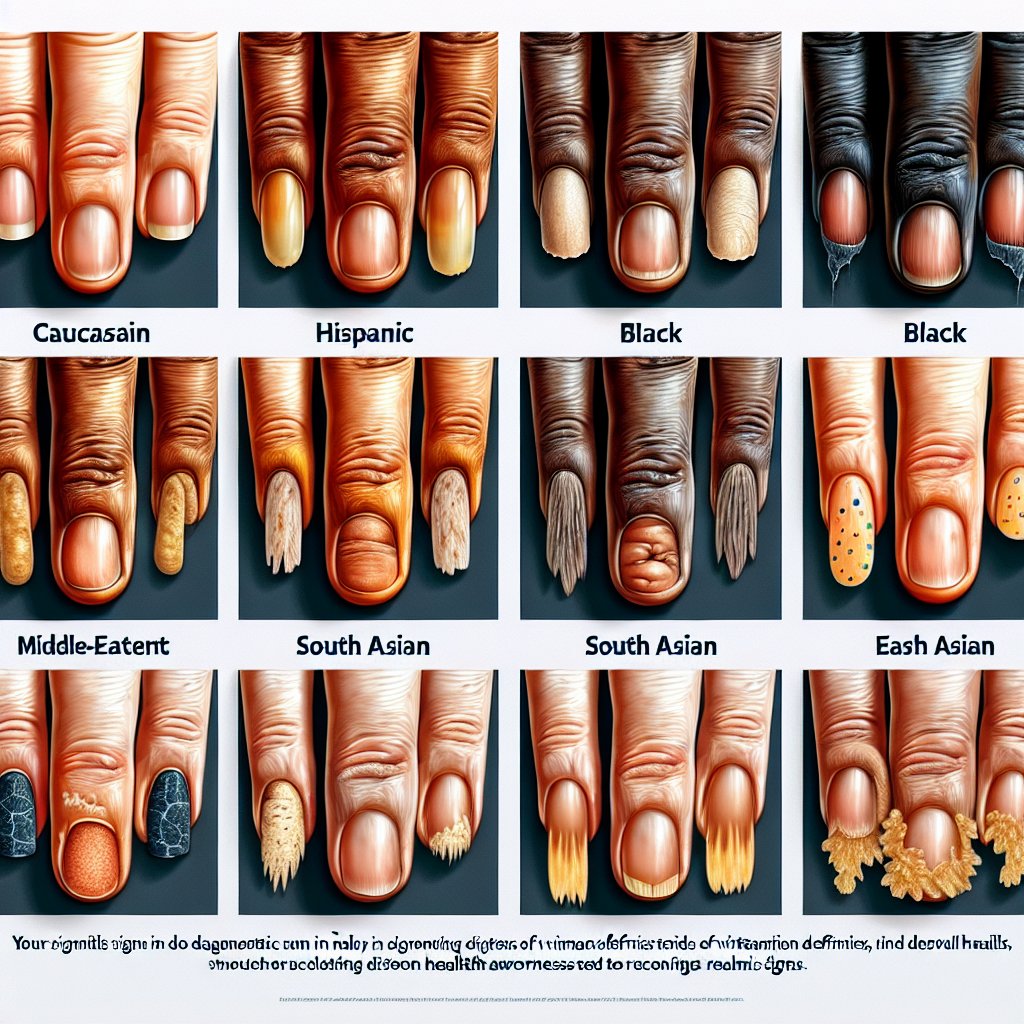Unlocking the Secrets: Signs of Vitamin Deficiency in Nails and What They Reveal About Your Health!
Unlocking the Secrets: Signs of Vitamin Deficiency in Nails and What They Reveal About Your Health!
Welcome to our deep dive into the fascinating world of nail health! While we often think of nails as a canvas for colorful polish or a fashion statement, they can actually tell us a lot about our overall health. From the strength and texture of the nails to the color and presence of ridges, these seemingly small aspects can be indicative of potential vitamin deficiencies and other health issues. In fact, our nails can act as a window into our internal well-being, serving as a direct reflection of our nutrition and lifestyle.
Research has shown that various nail conditions might be linked to specific vitamin deficiencies, and paying attention to these signs could provide early insights into our health. Join us as we explore the importance of nail health and uncover how they can serve as valuable indicators of our overall well-being.

Overview of Nail Health
When it comes to our overall health, our nails can be a telling indicator of the state of our well-being. But first, let’s take a closer look at the structure of our nails and their role in reflecting our overall health status.
Our nails are composed of a tough protein called keratin, the same protein found in our hair. They consist of several parts, including the nail plate, the nail bed, the cuticle, and the nail root. The health of our nails is influenced by a variety of factors, including genetics, nutrition, and overall health.
Nails can serve as a window into our body’s internal health. Changes in the appearance, texture, or color of our nails can often signal underlying health issues, including potential vitamin deficiencies. For instance, brittle or spoon-shaped nails can be indicative of an iron deficiency, while white spots may suggest a deficiency in zinc. By paying attention to these signs, we can gain valuable insights into our overall health status.
Common Types of Vitamin Deficiencies
When it comes to the health of our nails, certain vitamin deficiencies can lead to various abnormalities. Let’s explore some common vitamins that play a crucial role in nail health:
Vitamin A
Vitamin A deficiency can manifest in the nails as dryness, brittleness, and ridges. Including foods rich in vitamin A, such as carrots, sweet potatoes, and spinach, can help improve nail health.
Biotin (Vitamin B7)
Biotin deficiency is often associated with brittle and weak nails. Adding biotin-rich foods like nuts, seeds, eggs, and avocados to your diet may aid in addressing this deficiency and promoting stronger, healthier nails.
Vitamin C
Vitamin C is essential for collagen production, which contributes to the strength and integrity of nails. A lack of vitamin C may lead to slow nail growth and hangnails. Citrus fruits, strawberries, and bell peppers are excellent sources of vitamin C.
Ensuring that your diet contains these essential vitamins can significantly impact the health and appearance of your nails, helping to prevent deficiencies that may cause abnormalities.
Understanding the impact of these vitamin deficiencies on nail health can empower you to make informed choices in your diet to promote strong and beautiful nails.
Signs of Vitamin A Deficiency in Nails
One of the most visible signs of vitamin A deficiency can be observed in the nails. When your body lacks sufficient vitamin A, your nails may become brittle, dry, and develop ridges. In severe cases, the nails may even develop a concave shape, a condition known as koilonychia. This deficiency affects the appearance and strength of your nails, making them more prone to breakage and slower growth. Paying attention to these signs can provide valuable insights into your overall health and nutritional status.
Signs of Biotin Deficiency in Nails
If you notice your nails becoming brittle, thin, or discolored, it could be an indication of biotin deficiency. Biotin, also known as Vitamin B7, is crucial for maintaining healthy nails. Research has shown that a lack of biotin can lead to brittle nails that are prone to splitting and breaking. In severe cases, it may even cause the nails to become thick and rough with an uneven surface.
Additionally, white or brownish discoloration marks on the nails, known as leukonychia, are also linked to biotin deficiency. This occurs due to disruptions in the nail matrix, which is the area where the nail is formed.
It’s essential to pay attention to these signs as they can be an early indicator of a potential biotin deficiency. Addressing this issue through dietary changes or supplementation can help restore the health of your nails and overall well-being.
Iron deficiency can have a significant impact on nail health, leading to visible symptoms that indicate a potential vitamin deficiency. Research has shown that iron deficiency can cause nails to become brittle, spoon-shaped, or develop ridges. This is due to the decreased production of hemoglobin, which affects the oxygen supply to the nails, leading to changes in their appearance. Paying attention to these visible symptoms can provide valuable insights into potential vitamin deficiencies in the body, prompting individuals to seek the necessary medical advice and dietary adjustments.
Detailed explanation of specific changes in nails that indicate underlying vitamin deficiencies
When it comes to our overall health, our nails can often be a surprisingly accurate indicator of potential vitamin deficiencies. One common sign of vitamin deficiency is spoon-shaped nails, technically known as koilonychia, which can indicate an iron deficiency. Biotin deficiency, on the other hand, may manifest as brittle and thin nails. Additionally, white spots on the nails can signal a lack of zinc, while ridges and dry, cracked nails might point to insufficient levels of vitamin B7. Recognizing these specific changes in your nails can provide valuable insights into your overall health and potential need for certain vitamins and minerals.

Brittle Nails: A Sign of Vitamin Deficiencies
Have you ever noticed your nails becoming brittle and easily breakable? This could be a sign of certain vitamin deficiencies. According to scientific research, brittle nails can be an indicator of inadequate levels of biotin, vitamin C, and vitamin E. Biotin, also known as vitamin B7, plays a crucial role in maintaining the health of our hair, skin, and nails. Vitamin C is essential for collagen production, which is vital for nail strength, while vitamin E is known for its antioxidant properties, helping to maintain nail health. If you’ve been experiencing brittle nails, it might be time to take a closer look at your diet and consider incorporating more nutrient-rich foods to address potential deficiencies.
Linking Koilonychia to Specific Vitamin Deficiencies
Have you ever noticed your nails looking spoon-shaped or concave? This curious condition is called Koilonychia, and it could be a sign of certain vitamin deficiencies in your body. Research has shown that Koilonychia can be linked to a lack of iron, as well as deficiencies in vitamin C and B12.
Iron is vital for the production of hemoglobin, a protein in red blood cells that enables them to carry oxygen to your body’s tissues. When your body lacks iron, it impacts the structure and strength of your nails, leading to Koilonychia. Additionally, low levels of vitamin C and B12 can hinder the body’s ability to absorb iron, further exacerbating the deficiency.
If you notice spoon-shaped nails, it might be a good idea to incorporate more iron-rich foods into your diet, such as lean meats, spinach, and lentils. Including vitamin C-rich foods like oranges, strawberries, and bell peppers can also aid in the absorption of iron. Finally, consider adding sources of vitamin B12 such as fish, dairy, and fortified cereals to promote healthy nail growth.
Exploring Nail Pitting and Nutrient Deficiencies
Have you ever noticed small dents or pits on your nails? These indentations can actually signal specific nutrient deficiencies in your body. This common condition, known as nail pitting, can be an important clue to your overall health.
Scientific research has shown that nail pitting is associated with certain vitamin deficiencies, particularly a lack of biotin, also known as vitamin B7. Biotin plays a crucial role in maintaining healthy nails, skin, and hair. A study published in the Journal of the American Academy of Dermatology found a significant correlation between nail pitting and reduced biotin levels.
If you notice nail pitting, it’s essential to consider potential underlying vitamin deficiencies. Adding biotin-rich foods to your diet, such as eggs, nuts, and seeds, can help support nail health. Additionally, incorporating a biotin supplement may also be beneficial. However, it’s always important to consult with a healthcare professional before making any significant changes to your diet or taking supplements.
Importance of Seeking Medical Advice
When it comes to understanding the signs of vitamin deficiency in your nails, it’s essential to consult a healthcare professional for proper diagnosis and treatment. While we can gather valuable insights from the appearance of our nails, it’s important to note that multiple deficiencies or underlying health conditions can present similar symptoms. Seeking medical advice ensures that you receive an accurate diagnosis based on comprehensive assessments, including blood tests and physical examinations. This allows for tailored treatment plans that address your specific deficiencies, leading to improved overall health and well-being.
Remember, a healthcare professional can provide personalized recommendations that are safe and suitable for you. They can also help identify any other potential health issues that may be contributing to the condition of your nails, providing a holistic approach to your well-being.
Tips on Maintaining a Balanced Diet to Prevent Vitamin Deficiencies Affecting Nail Health
Ensuring that you maintain a balanced diet is crucial in preventing vitamin deficiencies that can have an impact on the health of your nails. Here are some tips that can help you maintain a diet to prevent vitamin deficiencies affecting nail health:
1. Eat a Variety of Nutrient-Dense Foods
Include a wide range of nutrient-dense foods in your diet such as leafy greens, colorful fruits and vegetables, nuts, seeds, and lean proteins. This ensures that you get a good mix of essential vitamins and minerals.
2. Consider a Multivitamin Supplement
If you struggle to get an adequate amount of vitamins and minerals from your diet alone, consider taking a high-quality multivitamin supplement to fill in the gaps. Consult with a healthcare professional before starting any new supplements.
3. Consume Adequate Protein
Protein is essential for nail health. Ensure that you include sources of lean protein in your diet such as chicken, turkey, fish, eggs, and plant-based proteins like lentils and quinoa.
4. Limit Processed Foods and Added Sugars
Processed foods and added sugars can negatively impact the absorption of essential nutrients in the body. Limiting these foods in your diet can help prevent vitamin deficiencies affecting nail health.
5. Stay Hydrated
Drink an adequate amount of water throughout the day to support overall health, including nail health. Dehydration can lead to brittle and weak nails.
By following these tips and maintaining a well-balanced diet, you can significantly reduce the risk of vitamin deficiencies affecting the health of your nails.
Conclusion
As we’ve explored the signs of vitamin deficiency in nails, it’s crucial to emphasize the importance of paying attention to nail health for overall well-being. Our nails act as indicators of our internal health and can provide valuable insights into potential vitamin deficiencies. By noticing and addressing changes in nail appearance, we can take proactive steps to optimize our health and well-being.
Remember, a balanced and nutrient-rich diet is a key factor in maintaining healthy nails. Including foods rich in vitamins, minerals, and essential fatty acids can significantly impact the health of your nails. Additionally, working closely with a healthcare professional can help identify and address any underlying vitamin deficiencies.
By prioritizing nail health and being mindful of the signs of vitamin deficiency, we can take an active role in promoting our overall health and wellness.


